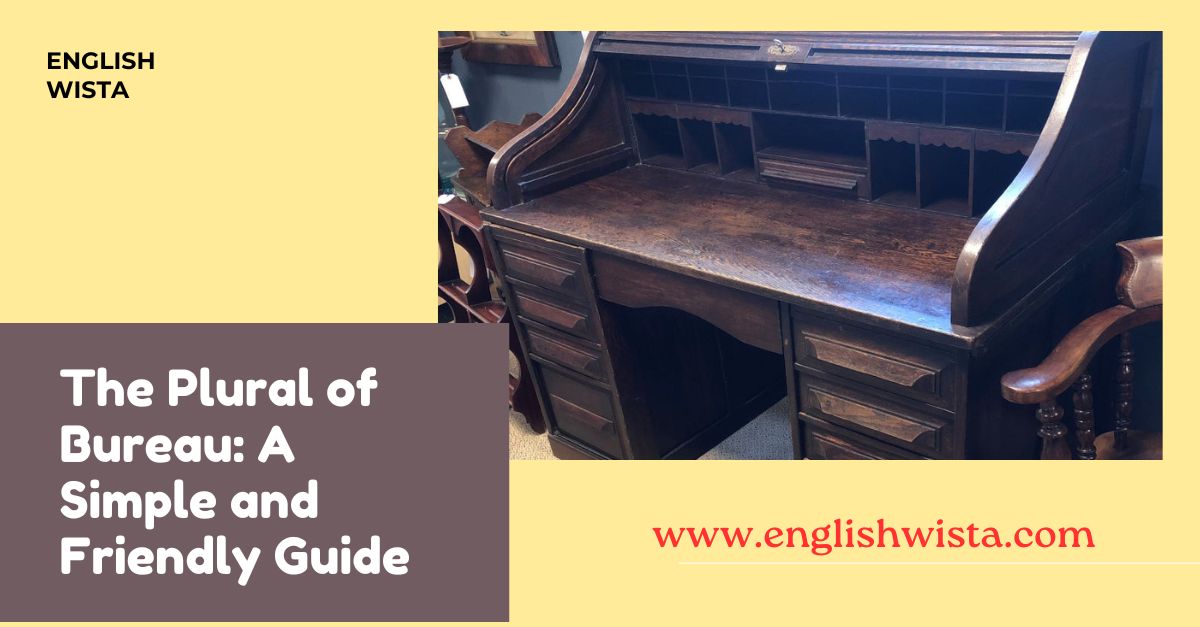English can be tricky sometimes, can’t it? Just when you think you’ve got the hang of plurals, along comes a word that makes you pause and wonder, “Wait, what’s the plural of this?” One word that often causes confusion is bureau. It looks French, it sounds fancy, and it definitely doesn’t seem to follow the same rules as simple words like “cat” or “table.”
So, what happens when you need to talk about more than one bureau? Do you say bureaus? Bureaux? Or something else entirely? Don’t worry, we’re going to explore this question step by step in a fun, simple way. By the end, you’ll feel confident using the plural of bureau in any situation.
Let’s take a closer look!
What Does “Bureau” Mean?
Before we dive into plurals, let’s start with the meaning.
The word bureau has a few different definitions:
- A desk or a piece of furniture with drawers.
- An office or a department, especially in government or organizations.
- Sometimes, it can even mean the people working in an office or agency.
So, depending on the context, you might use it to describe furniture or an institution. That’s part of why knowing its plural form is important you may need to talk about several bureaus or bureaux in different contexts.
What Is the Plural of Bureau?
Here’s the straightforward answer:
- Bureaus is the common plural in modern English.
- Bureaux is also correct, but it is the French-style plural and is less common in everyday English.
So, both forms are acceptable, but one is more widely used.
Think of it like this: if you’re writing a school paper, an office memo, or just talking with friends, bureaus will usually sound more natural. If you’re reading something British, older, or more formal, you might come across bureaux instead.
Why Are There Two Plurals?
This is a great question! The reason is simple: bureau is a French word that was borrowed into English.
In French, many nouns ending in “-eau” take “-eaux” in the plural. For example:
- French: château → châteaux
- French: tableau → tableaux
- French: bureau → bureaux
When English adopted the word, it also kept the French plural for a while. Over time, though, English speakers began to make it simpler by adding just an -s (like we do with most words). That’s why today we have bureaus as the standard plural, with bureaux surviving as a more traditional or formal option.
Which Form Should You Use?
The answer depends on the situation:
- Use bureaus for everyday writing and speaking. It’s simple, clear, and widely understood.
- Use bureaux if you want a formal touch, or if you’re reading or writing something that leans toward British English or uses traditional spelling.
In short: bureaus = modern, common; bureaux = formal, old-fashioned.
Is Bureau Singular or Plural?
This one’s easy. Bureau is always singular.
- One desk = one bureau.
- One government office = one bureau.
When you need to talk about more than one, that’s when you switch to bureaus or bureaux.
Real-Life Examples of Bureau in Sentences
Now let’s see how bureau and its plurals look in real sentences. These examples will help you spot the difference and understand when to use each form.
Using Bureau (singular):
- I placed the documents in the top drawer of the bureau.
- The FBI is a federal bureau in the United States.
- She works at a travel bureau downtown.
Bureaus As (plural):
- Several government bureaus are responsible for managing public safety.
- The antique shop has three old wooden bureaus for sale.
- Different news bureaus around the world reported on the story.
Using Bureaux (plural, formal or traditional):
- The European Union has many administrative bureaux.
- The report was prepared by various research bureaux.
- Historical texts often mention colonial bureaux in foreign countries.
You can see that in modern, everyday English, bureaus feels more natural. But both are correct!
Other Words That Follow a Similar Pattern
Bureau isn’t the only word in English that has two possible plurals because of its French origin. Let’s look at a few:
- Chateau → chateaus or châteaux
- Tableau → tableaus or tableaux
- Plateau → plateaus or plateaux
Notice the pattern? The French-style plurals end in -eaux, while the simpler English-style plurals just add an -s.
This makes bureau easier to remember. If you see a French-looking word ending in -eau, chances are it can have two plural forms.
Fun Fact: The Origin of Bureau
Here’s a little extra language trivia.
The word bureau originally came from the French word for “cloth covering a desk.” Over time, it began to mean the desk itself, then the room where the desk was kept, and eventually the office or organization that worked in that room.
So, the meaning grew over the centuries kind of like how “the crown” can mean both the object and the monarchy. Pretty cool, right?
Common Mistakes to Avoid
When it comes to bureau, people sometimes get mixed up. Here are a few things to watch out for:
- Don’t use “bureauses.” That’s not a word. Stick with bureaus or bureaux.
- Don’t confuse bureau with bureau drawer. In American English, a “bureau” often means a dresser with drawers. But in another context, it could mean a government office. Pay attention to which meaning is intended.
- Don’t overthink it. Both plurals are correct, and you won’t be wrong if you use bureaus in most everyday cases.
Quick Tips for Remembering the Plural
Here are a few easy memory tricks:
- If you’re writing casually → go with bureaus.
- If you want to impress someone with your French spelling → use bureaux.
- Think of “bureau” like “chateau” both have two plural forms.
Practice Sentences for You
To really make it stick, here are some fill-in-the-blank sentences. Try answering them in your head before checking the answers.
- The news ________ covered the story from every angle.
- She bought two antique ________ at the flea market.
- The colonial administration was organized into several ________.
Answers:
- bureaus or bureaux
- bureaus
- bureaux
Why Does This Matter?
You might wonder, “Do I really need to know both plurals?” The answer is yes at least to recognize them.
Imagine reading a newspaper that says, “Foreign bureaux reported a sudden change.” If you only know “bureaus,” you might pause and get confused. Knowing that both forms exist saves you from second-guessing.
It also helps if you’re learning English as a second language. These little details make your vocabulary stronger and your confidence higher.
Fun Extra: Bureau in Other Languages
Here’s something interesting:
- In French, it’s still bureau/bureaux.
- In Spanish, the word isn’t used, but similar words like “oficina” mean office.
- In Italian, you might see “ufficio.”
So while English borrowed the word, it didn’t stay alone it has cousins across many European languages!
Conclusion
So, what have we learned today?
- The word bureau means a desk, an office, or sometimes the people in an office.
- The plural can be bureaus (most common in modern English) or bureaux (the traditional French spelling).
- Both forms are correct, so you can use either depending on the situation.
- Remember: bureaus = everyday, bureaux = formal.
The plural of bureau doesn’t have to be confusing once you know the story behind it. Next time you come across the word, you’ll know exactly which form to use and why.
Now you can impress your friends, teachers, or coworkers by confidently saying, “Both bureaus and bureaux are correct plurals!”
Learning English is full of these little surprises, but each one you master makes the language feel a little friendlier.



